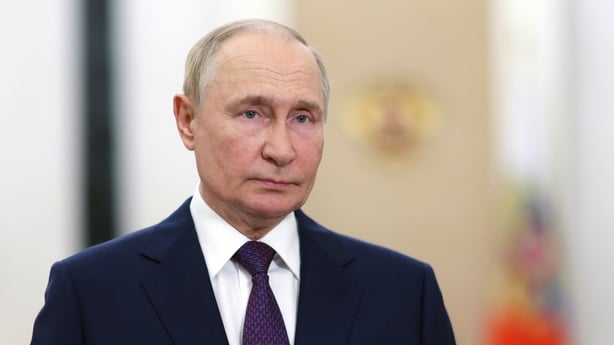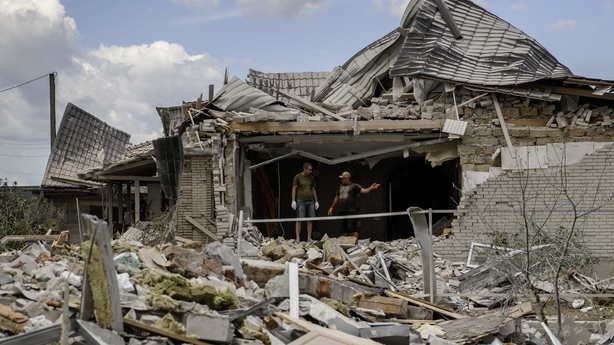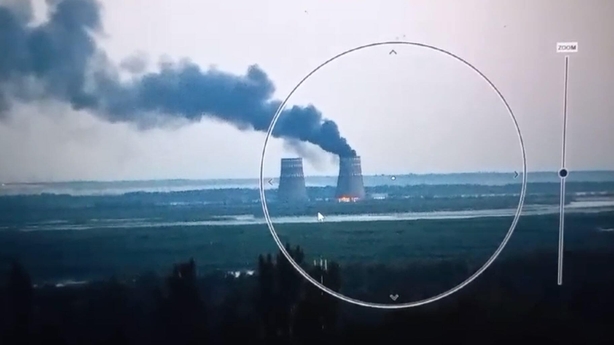Ukraine's army chief Oleksandr Syrskyi has said that Kyiv controls around 1,000 square kilometres of Russia's Kursk region, in his first comment on the shock cross-border incursion.
President Volodymyr Zelensky published a video excerpt of Syrskyi's report on Telegram. Zelenskiy said he ordered the preparation of a "humanitarian plan" for the area.
Ukraine's State Security Service (SBU) also said that Russia was trying to falsely accuse Kyiv's military of war crimes as Ukraine pressed on with a ground incursion into Russia's Kursk region.
The SBU said on the Telegram platform that it had information showing Russia might stage crimes for which it would blame Ukraine.
Today, Alexei Smirnov, acting governor of the Kursk region, was quoted by Russian state media as saying that Ukrainian forces had used shells containing chemical weapons.
Reuters could not independently verify the claim.
Russian forces are struggling to repel Ukraine's biggest border incursion in almost two-and-a-half years of full-scale war.
Mr Smirnov said Ukraine had taken control of 28 settlements in the Kursk region, while Ukraine's military had not commented on the operation by this evening.

Earlier, Russian President Vladimir Putin saidUkraine was trying to undermine Russian stability with its incursion into the south of the country, but that it would not succeed.
"The losses of the Ukrainian armed forces are increasing dramatically for them, including among the most combat-ready units, units that the enemy is transferring to our border," Mr Putin told a televised meeting with top security officials and regional governors.
"The enemy will certainly receive a worthy response, and all the goals facing us will, without a doubt, be achieved."
It comes as two Russian regions bordering Ukraine ordered more evacuations today as Moscow battled to contain an unprecedented push onto its territory.
Ukraine sent troops into Russia last week in its biggest cross-border operation since Moscow launched its invasion in February 2022 and the most significant by a foreign army since World War II.
Authorities in the Kursk region announced they were widening their evacuation area to include Belovsky district, home to some 14,000 people. The neighbouring Belgorod region said it was evacuating its border district of Krasnoyaruzhsky.
"For the health and security of our population, we're beginning to move people who live in Krasnoyaruzhsky to safer places," Belgorod region governor Vyacheslav Gladkov said on Telegram.
Latest developments in Ukraine
The assault on Kursk had already led to 76,000 people being ordered out.
Mr Putin said it appeared that Ukraine was trying to improve its negotiating position in the war, but that there could be no question of negotiations with an enemy he accused of targeting civilians in its operation in the Kursk region.
He said Ukraine was trying to slow Russia's advance on other parts of the battlefront, but that Moscow's forces were still advancing.
Ukraine has not publicly disclosed the objective of the operation, which has caught Russia off guard after months of gradual Russian advances in eastern Ukraine.
Mr Putin's comments were the most detailed he has made so far since Ukraine staged its shock cross-border attack on 6 August.
They appeared aimed at demonstrating control of the situation and projecting confidence that the shock offensive would not succeed.
However, Mr Putin also told officials to be prepared for the situation to get worse before it gets better.
"The enemy will continue to try to destabilise the situation in the border zone, in order to shake up the internal political situation in our country," he said in response to a situation report delivered by the governor of Bryansk, another border region.
"Therefore, if today the Bryansk region is relatively calm, this does not mean that the same situation will remain there tomorrow."
We need your consent to load this rte-player contentWe use rte-player to manage extra content that can set cookies on your device and collect data about your activity. Please review their details and accept them to load the content.Manage Preferences
A top Ukrainian official told AFP over the weekend that the operation was aimed at stretching Russian troops and destabilising the country after months of slow Russian advances across the frontline.
The assault appeared to catch the Kremlin off guard. Russia's army rushed in reserve troops, tanks, aviation, artillery and drones in a bid to quash it.
But the army on Sunday conceded that Ukraine had penetrated up to 30 kilometres into Russian territory in places.
In a briefing, the defence ministry said it had "foiled attempts" by Ukraine's forces to "break through deep into Russian territory" using armoured vehicles.
But it said some forces were near the villages of Tolpino and Obshchy Kolodez, some 25 kilometres and 30 kilometres from the Russia-Ukraine border.
A Ukrainian security official told AFP, on condition of anonymity, that "the aim is to stretch the positions of the enemy, to inflict maximum losses and to destabilise the situation in Russia as they are unable to protect their own border".
The Ukrainian official said thousands of Ukrainian troops were involved in the operation.
Russia's defence ministry said on Monday that its air defence systems had destroyed 18 Ukrainian drones - including 11 over the Kursk region.

Helicopters 'over your head'
On Sunday, each country blamed the other for a fire at the Russian-occupied Zaporizhzhia nuclear plant in southern Ukraine. Both sides - and the UN's nuclear watchdog - said there was no sign of a nuclear leak.
"No impact has been reported for nuclear safety," said the International Atomic Energy Agency, which has experts at the site. Kyiv and Moscow said there had been no rise in radiation levels.
In a later statement, the IAEA said it had requested "immediate access to the cooling tower to assess the damage".
A Moscow-installed official, Vladimir Rogov, said the blaze has been "completely extinguished" in a Telegram post Monday.
The plant's Russian-installed operator said on Monday that it was working normally following the incident and that all six reactors remained in "cold shutdown".


